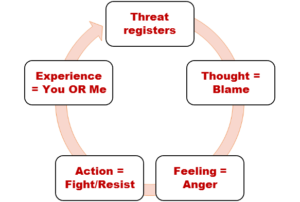Conflict and Self-Awareness: The Role of Core Values
Causes of conflict and what’s the new normal
Conflict comes in many forms. For the sake of our discussion, I divide the source into three categories:
- Competition for resources (like water or power)
- A core value challenge (like freedom)
- An insecurity trip wire
At any given moment, most people are experiencing some kind of conflict. In a developed nation, we are fortunate in that category # 1 above is a minimal threat to us. Unless of course, you are in corporate culture where power struggles may be overt, covert and just plain exhausting.
It is also possible that we have lived with conflict so long that we no longer recognize it as conflict and the potential damage to our wellbeing.
In case conflict wasn’t obvious…here’s your Conflict Quiz
- In conversations (the ones in your own head), do you say things like “I am so mad at ….” “This is so unfair.” “I hate that….”
- When speaking with other people, do you use words like “fault” or “blame”?
- Check out your own body language. Do you notice a furrow between your eyebrows from scowling routinely? Do you often clench your jaw or your fists? Is your posture stiff and rigid?
- Are you reactive and quick to show temper?
- Do you drive aggressively as a way to feel better or relieve tension?
- In conversations, do you have to be right?
If you answered YES, thank you for being honest!
If you answered NO to all of these then you are a Buddhist Monk who does not drive.

The Un-conflicted Monk
Core Values and Conflict
If you have identified some degree of conflict in your life from the exercise above, perhaps it can be traced to source #2 – a challenge to a core value.
Core values are the beliefs we live by. For me, I place supreme value on liberty, health/vitality, curiosity, human connection and empowering others.
Given that we have our own beliefs and values; some degree of conflict is normal. Your core values may be vastly different than your neighbor’s. Core values change as we age. What’s important to us at 21 is not even on our radar at 55. So to begin to ameliorate conflict, start with getting clear on your core values. And I really mean yours, not the ones the TV tells you to have. Not the ones an ex-husband told you to have. If you don’t know or are not sure, ask someone who really loves you to offer suggestions. If that doesn’t work, ask a Coach. We are great at creating clarity with our clients.
The Conflict Cycle
When we perceive a challenge to our core values, conflict is a natural result. When our core values such as family, freedom, or independence are challenged by circumstances and/or the people in our lives, we get upset. We find fault and we blame. We experience emotions like anger, resentment, agitation, or irritability. Our choice of action might be arguing or shutting down. At the heart of conflict, we adopt an attitude of win/lose. I win and you lose.
![]()

You can imagine that when many people go around with a you or me attitude, there’s going to be plenty of conflict in the world. In fact, this is where so many of us spend our time. We heap compassion on our families and our friends but if someone else is doing something that we believe challenges our core values – then watch out! We are not going to get along. You may not know it but I blame you for this conflict.
Making Matters Worse
When we are in conflict, we see few choices. We might confront the perceived cause. We might complain. Or, we might internalize the conflict until something causes us to lash out. The proverbial dam breaks. When the attack is directed at an innocent bystander, like our kids, our dog, or a stranger – it’s called off-loading. When we project our anger outwardly, the problem is amplified and we usually feel worse. Some part of us knows we acted like a jerk and while it feels good in the moment of release, the anger is misdirected.
We’ve all said or posted something in a moment of anger and haste and then regretted it. When we argue with people and our mouths lead our minds, we say things that we wish we could take back. With posted material, it’s permanent. The record remains.
As a coach seeking to empower you with life skills, let’s explore alternatives.
What’s my button?
The way to change any experience starts with self-awareness. The next time you get upset, ask yourself, what personal code or core value is being challenged? What? Be rationale? No way. I’m in emotional hijack. I’m too mad to be rational. Try it anyway.
The more we know about ourselves the better prepared we are to make the most of who and how we are. It’s the difference between reacting and responding. Reacting is automatic – ‘ready, fire, aim!’ Responding is about a thoughtful choice. If we fire, at least we have taken careful aim at the appropriate target.
I’ll show you mine if you show me yours?
Recognizing what you hold dear is step 1, and recognizing that the source of your conflict (a person) may have other values, is step 2. The first gives you the awareness to change what you think, feel and do. The second creates the opportunity to change the shared experience. Be curious. What value are they fighting (you) for? How could the conflict be radically different if you realized that you had something significant in common with the bearer of your blame? You have to ask in order to know.
Imagine what you could create if you bypassed conflict and used that energy for something you actually wanted. Powerful stuff!
Authentically,
Pepper
Stay tuned for next time on the Conflict Channel, “Dealing with Conflict at Work”
